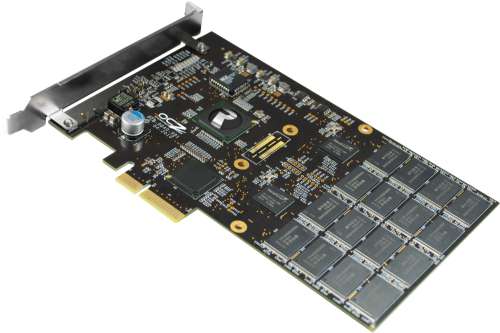- Qualcomm Launches Snapdragon 4 Gen 2 Mobile Platform
- AMD Launches Ryzen PRO 7000 Series Mobile & Desktop Platform
- Intel Launches Sleek Single-Slot Arc Pro A60 Workstation Graphics Card
- NVIDIA Announces Latest Ada Lovelace Additions: GeForce RTX 4060 Ti & RTX 4060
- Maxon Redshift With AMD Radeon GPU Rendering Support Now Available
OCZ Revo 120GB PCI Express SSD Performance Preview
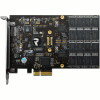
SSD’s are not considered to be “affordable” by many, and that’s especially true when talking about PCI Express versions. But, that’s soon to change, with the launch of OCZ’s Revo – a drive that barely charges a premium over current high-end SSD’s. While we iron out the details for our full review, we offer you this quick performance preview.
Oddly enough, solid-state drives share a few things in common with GPUs. With graphics cards there are cheap, entry-level cards that provide base-level functionality, but otherwise not much of anything else. Then there is the mid-range, budget-priced SSDs that offer reasonable performance in addition to normal functionality, the better of which could be compared to say the new GTX 460 or recently price-slashed HD 5830.
Then of course we have the high-end SSDs like the Vertex 2, Force series, or C300 flagship drives that are not much different from the premium HD 5870 or GTX 480 graphics cards, in that they set the standard to beat and everyone wants one!
But then, we can’t forget about the graphics cards like the HD 5970 or older GTX 295 that feature two high-end GPU cores on a single card, either. There are SSDs that naturally feature in effect two (or even four) solid-state drives in RAID on a single card, so our analogy is still intact. The OCZ Revo is one such “dual SSD” based drive.
However, that’s about where the similarities end. Very much unlike dual-GPU graphics cards, the OCZ Revo isn’t just another lofty SSD that only those willing to sell their left kidney could afford. OCZ is in the process of fine-tuning the recipe in order to bring the Revo SSD to market at prices only slightly above the cost of two individual Sandforce-powered SSDs of a similar capacity.
In effect, one 120GB OCZ Revo is equivalent to two 60GB Vertex 2 SSDs in RAID 0. What makes this so attractive is users will not need to risk their data using a cheap RAID card or worse, Intel’s Matrix software RAID setup. The RAID setup on the OCZ Revo is self-contained on the PCB and works behind the scenes. The only thing the user must do is copy the RAID drivers to a USB drive and load them during the Windows 7 installation. No other BIOS tweaking or RAID configuration is required.
Okay, perhaps we forgot one rather important similarity with graphics cards we should mention. The OCZ Revo is a PCI-E based solid-state drive, and as such features a PCI Express x4 interface. Like all PCI Express cards the Revo can be plugged into x4, x8, or x16 PCI Express slots. By choosing PCI Express to keep the RAID array directly on the card itself, this circumvents not just the SATA 3 issue but also prevents the potential for additional latency penalties resulting from chipset saturation.
The OCZ Revo will run the entire gamut of capacities available with models as small as 50GB (two 25GB SSD’s in RAID 0), all the way up to a bank account busting 480GB. While pricing on the 50GB Revo has not been disclosed, currently a single 60GB Vertex 2 would run $170 to give a fair idea. The 50GB model is advertised to deliver an eye-popping maximum advertised speed of 540MB/s reads, 450MB/s writes, and 70,000 IOPS. Sustained writes are listed to be 350MB/s, still well above the maximum potential of the SATA 2 specification. 120GB and larger models will have still even higher read/write specifications.
Of course this isn’t just a news article or press release, therefore we must have some benchmarks! The age of our storage testing platform is coming to an abrupt end, as a drive like the OCZ Revo simply demands to be installed in a more powerful system to reach its highest potential. Even so it should come as no surprise the 120GB OCZ Revo has obliterated the highest score in the overall PCMark Vantage tally, and done so again with the HDD suite overall score.
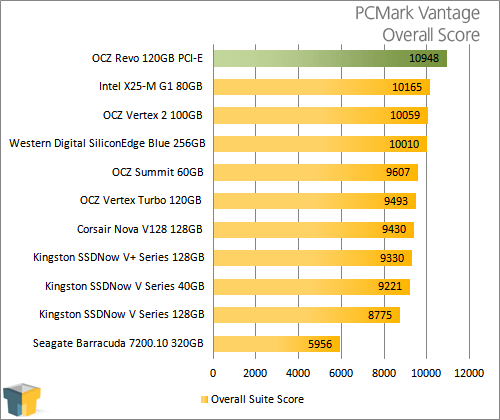
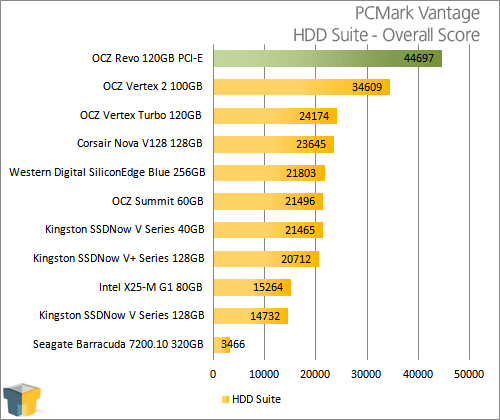
Although we didn’t think it was possible, the power of two SandForce controllers in RAID 0 shows that there is still performance to squeeze out of our aging storage test platform. Having two controllers to split the heavy workloads in our batch tests really pays off, with the Revo easily chopping a full minute off of the medium workload scenario and shaving almost a full two minutes off the heavy scenario compared to the previous best times.
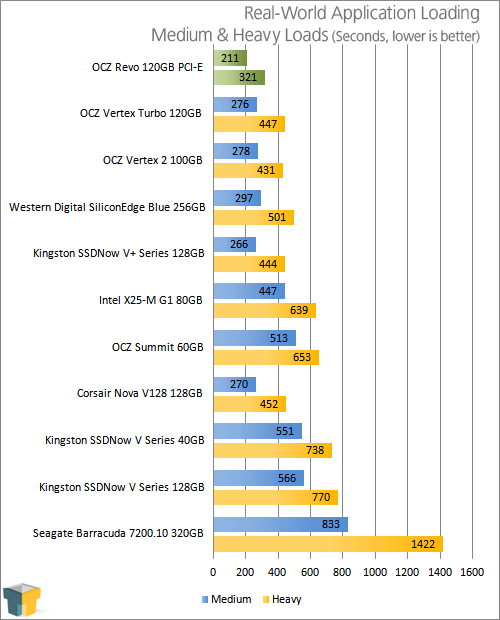
With Revo models expected to begin at 50GB and 80GB, affordable, truly high-performance SSDs will no longer require trips to the hospital or expensive surgery to acquire. OCZ will be launching the Revo within the next few months, and as with all OCZ SandForce SSDs, the Revo will carry a 3 year warranty. All we can say is, we can’t wait!
Discuss this article in our forums!
Have a comment you wish to make on this article? Recommendations? Criticism? Feel free to head over to our related thread and put your words to our virtual paper! There is no requirement to register in order to respond to these threads, but it sure doesn’t hurt!
Support our efforts! With ad revenue at an all-time low for written websites, we're relying more than ever on reader support to help us continue putting so much effort into this type of content. You can support us by becoming a Patron, or by using our Amazon shopping affiliate links listed through our articles. Thanks for your support!




